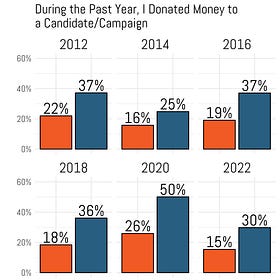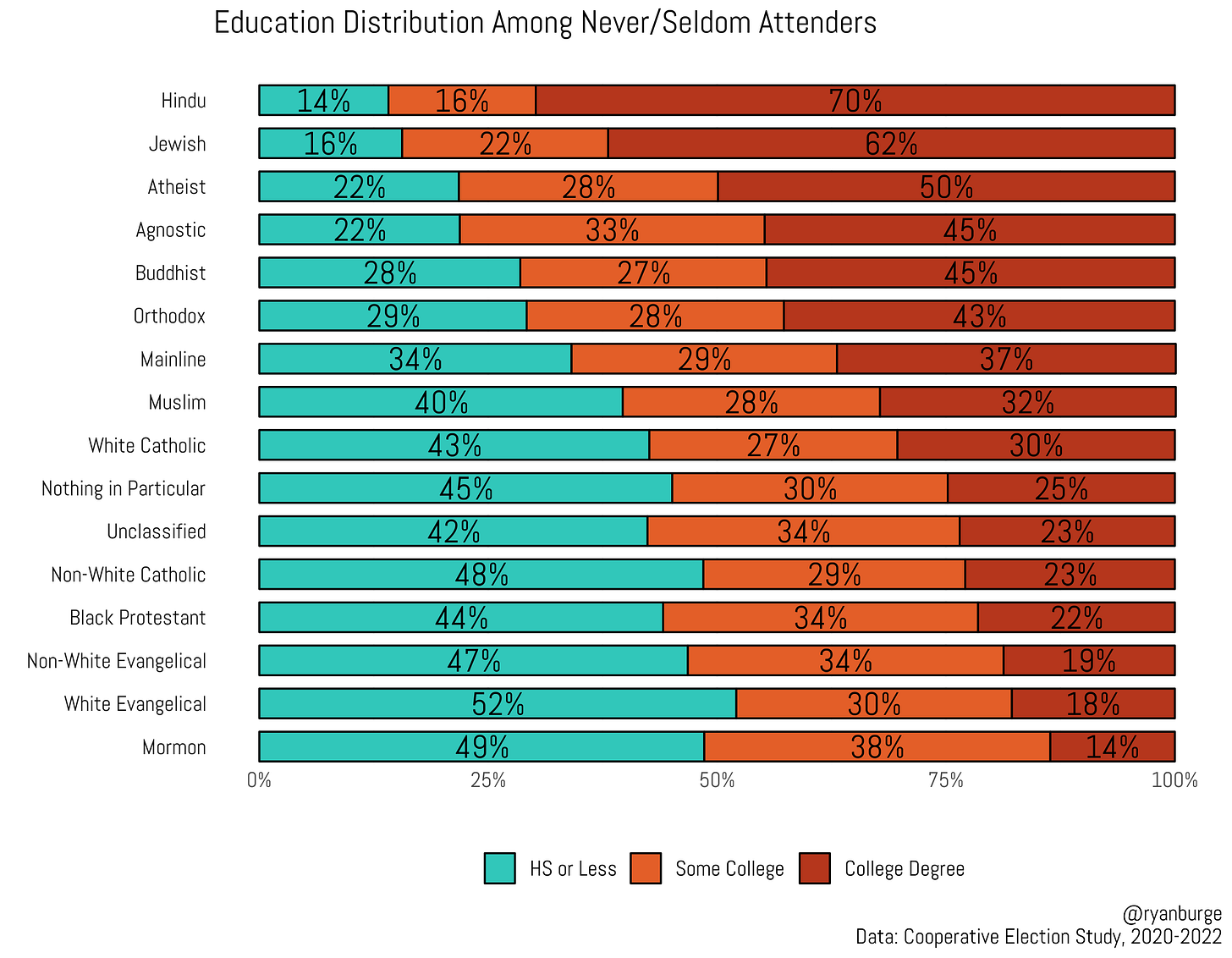Are There Any Real Differences Between an Atheist and a Never Attending Christian?
Why Religious Attendance is a Bad Way to Classify People
The last couple weeks there have been several posts on my Substack that have circled around the idea of religious attendance and its impact (or lack thereof) on partisanship, public opinion, and vote choice.
This one considered the issue of attendance and how it impacted people’s views of issues like gun control, immigration, and race. Once you control for partisanship, the data indicates that frequency of church attendance is basically irrelevant in most areas of public opinion.
Infrequent Church Attenders Were Trump's Base, Right?
I can’t point to one specific instance of this, but it’s something I see in the online discourse: “It’s the folks who don’t go to church who put Trump in the White House.”Graphs about Religion is a reader-supported publication. To receive new posts and support my work, consider becoming a free or paid subscriber.
Then, just last week I put together some graphs about the relationship between religious attendance and participating in the political process. The overall conclusion from that data is that religious participation and political participation go hand in hand, they don’t crowd the other out. In other words, low attending religious folks are politically disengaged and those who show up for worship the most are the ones attending city council meetings and donating to candidates.
Does Religious Attendance Drive Up Political Participation?
“I only have so many hours in my day.” That’s true for all of us. We have a finite amount of time to work, to sleep, to spend time with our families, and to find a hobby that makes us happy. Thus, every decision we make comes at the expense of time. If we choose to go to a movie, that’s three hours when we can’t mow the grass, do some laundry, or just take a nap.
But there was a key caveat to the previous piece - I excluded the non-religious from my analysis. As I wrote about back in May, this is because there is no more politically active group in American politics today than atheists. I really didn’t want to conflate low attending Protestants and Catholics with atheists/agnostics who obviously never attend religious services.
No One Participates in Politics More than Atheists
The last forty years of politics and religion has been focused squarely on the ascendancy of the Religious Right. I must admit that I’ve probably contributed my fair share to that discourse, as well. A motley crew of white evangelicals and traditional Catholics locked arms on some social issues, started voting in large numbers for Republican candidates,…
I’ve heard from several people about the differences between low attending religious folks and non-religious Americans and I wanted to get a bit wonky today to really crystallize my thoughts about the actual differences between the two groups.
Here’s a bit of my thinking about this. Two people can check the never/seldom attendance box on surveys but be completely different. Consider this - a person who takes a survey hasn’t been to a church service in five years. They don’t really think about theological matters much. But when confronted with the question, “What is your present religion, if any?” One person says that they are a Protestant, while another says that they are an atheist.
Does that distinction matter? It absolutely does. Both hypothetical people described their attendance as the same, but they are most certainly not equivalent. I know that because the data tells me that. Let’s go through the evidence.
First, I just wanted to calculate the share of every religious tradition that describes their attendance as seldom or never.
It should come as no surprise that 97% of atheists fit into these two attendance buckets, followed by agnostics at 93%, and nothing in particulars at 81%. But there are significant numbers of religious people who attend services less than once a year. That describes 42% of all mainline Protestants and about 35% of Catholics. Even a quarter of white evangelicals say that they attend seldom or never. The groups that are the least likely to pick these two options on surveys are Muslims at 16% and Mormons at 15%.
So, beyond the nones, there are plenty of people who say that they are Missionary Baptist, Muslim, or Mormon but then go on to say that they attend religious services never or seldom. This is not a small slice of the country, and it’s clearly growing, too.
But are never/seldom attending atheists demographically different than those white Catholics who check the same boxes on religious attendance? There is a clear divergence when looking at the distribution of education.
For instance, among never/seldom attending atheists, 50% have a four-year college degree. For low attending Jews, it’s even higher at 62%. For most Christians traditions, the level of education that they report is very low. For instance, half of white evangelicals who attend seldom/never stopped at a high school diploma. For nearly every Christian group in this sample who attend seldom/never, the high school or less share is larger than those with a college degree.
Before I move on to politics, let me just make this interesting observation from the data. I was trying to see how education shifted from the low attenders to the weekly attenders in each of these traditions and there are clear differences here.
For every Christian tradition, the educational attainment of weekly attenders is significantly higher than for those who report seldom/never attending. 38% of weekly attending white evangelicals have a four-year college degree. It’s just 18% of those in the seldom/never camp. For white Catholics, the gap is also twenty percentage points: 50% versus 30%. I will keep hammering away at this point: the pews each Sunday are filled with folks with a high level of education and solid incomes. The folks at the bottom of the socioeconomic spectrum are not showing up for regular worship.
But the point of all this is politics. Is a never attending white evangelical any different than a never attending atheist or agnostic? I mean, they engage in religious practice at the same rate, so sermons and congregational worship is just not part of their lives. That should lead to similar outcomes on election day, right?
Here’s what I did. I restricted the sample to just those who attend religious services seldom or never. Then I calculated the mean political partisanship for all sixteen religious groups along with their mean political ideology and plotted them on one graph. This makes it clear just how big of a divide exists among seldom/never attenders.









